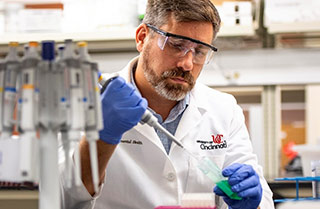April 03, 2019

Langevin is developing a test for early detection of mouth and throat cancers.
(Photo courtesy of University of Cincinnati)
The American Cancer Society (ACS) awarded Scott Langevin, Ph.D., a $782,000 grant for his research using a mouth rinse test to detect mouth and throat cancers in their earliest stages. He credits his early career support from the University of Cincinnati (UC) Center for Environmental Genetics for helping him get the grant.
“By providing me the Genomics, Epigenomics, and Sequencing Core resources, the CEG helped me generate the preliminary data necessary to win the ACS grant,” said Langevin, who is a 2015 CEG Next Generation Biomedical Investigator, a 2016 CEG Pilot Project awardee, and an assistant professor in the UC College of Medicine Department of Environmental Health.
Langevin is working to improve screening tests for mouth and throat cancers by studying traits in mouth rinse samples, called oral rinses. According to Langevin, mouth and throat cancers accounted for an estimated 51,540 new cancer diagnoses and 10,300 deaths in the U.S. in 2018. The earlier a patient is diagnosed, the better their chances of treatment success.
His research team previously identified chemical changes called methylation to 22 specific regions of DNA and showed that this methylation pattern can be used to identify patients with mouth and throat cancers.
The ACS grant will allow Langevin to assess whether the methylation pattern in oral rinse samples can be used as a tool for detecting new or recurring tumors during post-treatment follow-up. To do this, he will enroll a cohort of 120 newly diagnosed patients with mouth or throat cancer from the UC Cancer Institute. He will collect oral rinse samples before treatment, every three months during post-treatment for two years, and again once the patient is deemed disease-free. He will also test people without these cancers as controls.
"With this project, we hope to evaluate the potential of this oral rinse methylation panel as a clinical tool for early detection of cancer recurrence following diagnosis and treatment,” said Langevin in a UC News Story. "This will hopefully help us develop a new test that can reduce the impact of these cancers.”


